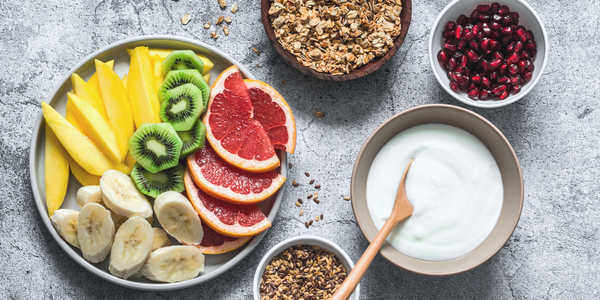
Wondering how to digest food faster?
A few simple, yet actionable tips on how to improve digestion - such as exercise for digestion - can improve intestinal speed while also benefiting overall health.
Learn how to speed up digestion by putting healthy habits into practice today!
How to Improve Digestion
Digestion deals with several factors, but there are simple and significant fixes that can help with digestive speed. Discover dietitian-approved tips when it comes to gut health and improving digestion.
Chew Foods Thoroughly
Chewing is the first mechanical process that food goes through. So, the best place to start improving the way food is broken down is by starting at its first stop!
It may seem basic, but chewing foods thoroughly (at least 15 to 20 times) can help smooth the digestive process.
Debunk the "Big Three" Meals
Having just three meals in a traditional schedule (breakfast, lunch, dinner) may actually be harming digestive health and slow digestion.
Especially for those with digestive issues, eating six smaller, more frequent meals every three to four hours may be the way to go. This accommodates the natural speed of the digestive tract instead of overwhelming it.
Hydrate Adequately
Inadequate water intake can increase the risk of constipation, as water helps soften stools. Adequate hydration is imperative for digestion, as water also helps nutrients break down and become more efficiently used within the body.
Easy hacks to drink more water include:
• Using larger cups
• Taking advantage of flavor enhancers
• Making healthy hydration more convenient
• Ordering water at restaurants
Avoid Triggering Substances
Substances such as excessive caffeine, alcohol, or smoking can negatively impact gut health and play tricks on appetite.
For example, caffeine from coffee can stimulate too much movement in the large intestine/colon and create an upset stomach. Smoking is also known to mess with appetite signals.
Heavy alcohol intake may cause damage to the stomach lining and lead to malabsorption issues. Alcohol can also exacerbate symptoms of common GI conditions like irritable bowel syndrome and cause diarrhea and constipation. It is recommended men and women get no more than two drinks and one drink per day, respectively.
Dine In a Relaxing Environment
Simple yet effective, eating in a relaxing environment truly allows time to slow down. Relaxing and eating slowly are important steps to easing digestion.
Eating more mindfully - like paying attention to the food at hand - can also help one slow down at mealtimes. Overall, try regularly eating at a designated spot other than a work desk or in front of the TV.
Strive To Manage Stress
Both acute (short-term) and chronic (long-term) stress play a role in poor digestion. In fact, stress is implicated in the development of inflammatory bowel disease and irritable bowel syndrome.
Managing stress is a personal pursuit. However, common stress management techniques include exercising, reading a book, flowing into yoga positions, and chatting with a friend.
Reduce Processed Food & Eat Wholesome Food Instead
Processed food often contains additives like glucose, excessive salt, artificial sweeteners, and other chemical contents. Overeating foods
Sticking to wholesome foods, such as whole grains and fresh produce, means a better chance of getting necessary nutrients. Regularly eating a well-balanced diet helps improve digestive (and overall) health.
Consume Probiotics
Probiotics are the "good" bacteria that help promote a healthy gut microbiome. Popular sources of probiotics include yogurt, kefir, and fermented foods. Common probiotics to look for on ingredient labels are lactobacillus and bifidobacteria.
Probiotics also feed off prebiotics, carbohydrates that cannot be digested. Increase prebiotic intake as well, which includes asparagus, bananas, oatmeal, and legumes.
Increase Fiber Intake
Fiber, which comes from plant foods like fruits, vegetables, and grains, is fuel for healthy digestion! Dietary fiber helps absorb water in the digestive tract and contributes bulkiness to the stool to initiate regular bowel movements.
As a general rule, men should aim for 38 grams of fiber per day and women at least 25 grams. Ensure adequate fiber by switching to whole grain products, eating more plant-based proteins like beans, and adding at least two servings of fruits and veggies (skin on!) with meals.
Figure Out Food Intolerances
Food intolerance exists on a spectrum. Working with a dietitian to discuss abnormal digestion can help unearth a potential digestive disorder or food intolerance.
A healthcare team can then better (and more quickly) treat digestive problems. A digestive enzymes supplement recommended by a dietitian may also help.
Exercise for Digestion
Dismissing a sedentary lifestyle supports health in all aspects of health and getting active further promotes digestion. Partaking in exercise helps stimulate bowel contractions and "gets things moving" - movement of the body encourages movement of the bowel!
Make it a point to enjoy movement on a daily basis, aiming for at least 150 minutes of aerobic exercise weekly. These minutes can even be broken down into 10-minute segments, which may mean a quick brisk walk at the end of a lunch break.
Also worth noting, let the food settle for a bit before exercising after eating. This ensures food does not stall or reverse its path down the digestive tract.
The Final Word On Faster Digestion
There is no "quick fix" to improve digestion. Instead, there are many simple tips individuals can implement today to encourage digestive health and healing like staying hydrated and eating wholesome foods.
Overall, taking the time to heal digestive problems is actually the quickest path to a lasting solution!
References:
Groves M. The 11 Best Ways to Improve Your Digestion Naturally. Healthline. Published July 4, 2018. https://www.healthline.com/nutrition/ways-to-improve-digestion.
Kooienga M. What You Need to Know to Improve Your Digestion. Nutrition Stripped. Published May 15, 2020. https://nutritionstripped.com/improve-digestion/.
The Real Food Dietitians. 5 Ways to Improve Your Digestion Naturally. The Real Food Dietitians. Published March 1, 2016. https://therealfooddietitians.com/5-ways-to-improve-your-digestion-naturally/.







